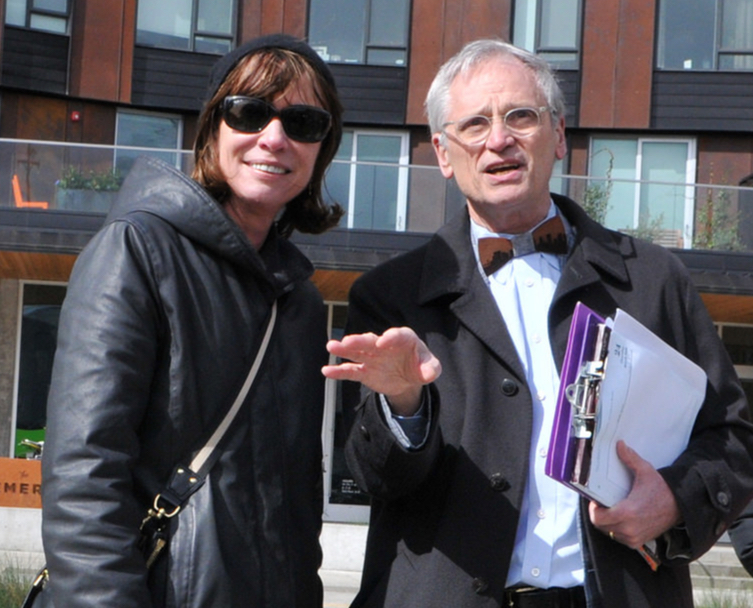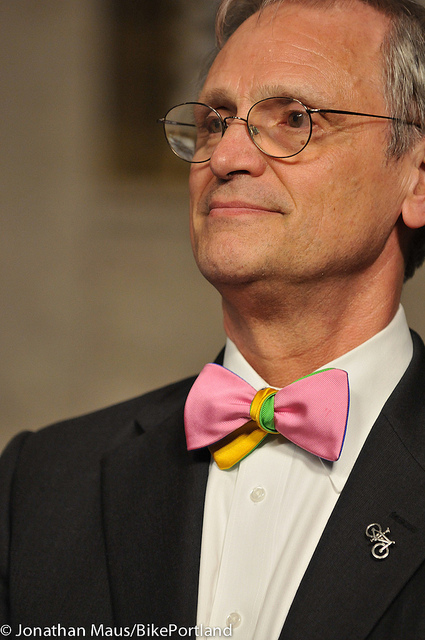The face of bicycling in Oregon isn’t that mad about our state’s new, $15 tax on new bicycles.
U.S. Congressman Earl Blumenauer, who served six years in the Oregon House of Representatives and nearly 10 years as a Portland city commissioner, shared via a phone interview yesterday that he feels the tax is a “modest fee” that isn’t that big of a deal when viewed in the light of the overall infrastructure funding package.
I caught up with Blumenauer from his office in Washington D.C. where he’s standing against strong political winds.
“I think this is a really great opportunity for the cycling community to take a step back and think about the bigger picture,” he said.
Blumenauer probably knows more about the “bigger picture” than anyone in the bike advocacy game. He has fought for bicycle-related transportation funding for about 40 years. During that time he’s heard all the anti-bike arguments you can imagine.
“One of the arguments we hear repeatedly is that cyclists don’t have any skin in the game… so there’s been blowback.” Blumenauer thinks the “cyclists don’t pay” argument has only gotten louder as more money has gone to bike projects. During his tenure in politics, Blumenauer has seen Oregon implement the pioneering 1971 “Bicycle Bill” which sets aside 1 percent of all the state’s highway gas tax money for biking and walking infrastructure (which should equal about $3.7 million per year over ten years in the new bill. And federal programs like Safe Routes to School, Transportation Enhancements, and TIGER grants have funded billions in bike infrastructure. “That’s big money,” he said.
“For me, the bill represents a coming-of-age of the cycling movement. It is part of a key for more resources in the future and it’s an acknowledgment that we’re players.”
— Rep. Blumenauer
Blumenauer acknowledged that, “The cheapest way to solve traffic congestion is to get somebody out of the car in front of you,” and that the Portland region has made “significant improvements in getting more people out of cars and onto bikes.” “But,” he added, “It’s not always as compelling,” which I took to mean bicycling still doesn’t hold the political sway it deserves. And to build more political power, Blumenauer feels it’s essential that bicycle advocates have a seat at the table. In his mind, going along with this tax is simply part of the “give-and-take” of compromises that advocates should expect and engage in.
Given the bill’s unprecedented investment in public transit and Safe Routes to School — and the increased Bike Bill funding thanks to the higher gas tax — Blumenauer sees the bike tax as being “relatively modest” and “an interesting response to some of the people who argue that cyclists don’t pay their own way and that we’re already spending too much on cycling.”
While saying, “It’s not exactly how I would have designed the package,” Blumenauer is positive about the bill overall, calling it “balanced” and an important step for bicycling. “I think it moves us forward and it’s building relationships, trust and momentum that can help us next time; because we’ve got to do a lot more than this. I hope people will take a look at the big picture and see how it all evolves and realize that if we’re going to be players in the bike/ped space, it’s important to be part of the whole process.”
Advertisement

By “process” he means the sausage-making that went into the bill. From his view, lawmakers didn’t ignore cycling. On the contrary, he sees the bill as, “an acknowledgment of the power of the cycling community… We were an important component of the deal-making.”
Here’s a bit more of his comments on that angle of it:
“This was about preserving our seat at the table and showing we’re not opposed to participating… I think that having a little tiny tax makes it less likely that something worse comes out of left field and now a principle has been established that the cycling community is politically important and we are part of the transportation and air quality solution and I think it is highly likely that this will be part of a process that enables us to have a larger footprint in the future and I think the precedent is we’re going to be listened to and we’re flexible and we have a broad-based approach.”
Continuing on that line of thinking later in our conversation he said, “For me, the bill represents a coming-of-age of the cycling movement. It is part of a key for more resources in the future and it’s an acknowledgment that we’re players.”
Is he concerned that the bike tax tarnishes Oregon’s biking reputation he has done so much to burnish? That question made him think of the snarky tweet from his friend and former New York City DOT Director Janette Sadik-Khan. Last week she posted,”Oregon adopts nation’s 1st & only bike tax. I guess the longtime US cycling leader finally got tired of winning.”
Chuckling, he said, “I haven’t had a chance to respond to Janette, but what I want to say is, ‘Janette, I love you… But is a small fee dedicated to bike infrastructure that’s part of a much bigger package, really so misguided? And wouldn’t some of the flack you caught in New York have been moderated a little tiny bit if it appeared the cycling community had more skin in the game?'”
Oregon’s bike tax is making news around the country and it’s likely other policymakers are politicians are eyeing it for their states as well. I asked Blumenauer how he’ll respond when someone asks him if they should pursue a bike tax. “I’d tell them to take a look, not at the tax, but at the package. Look at the process, look at the dollars devoted to cycling… This tax is providing an answer to the age-old controversy that bicycles get a free ride, that it’s not fair they don’t pay for the roads… I’d tell them that this was an effort in Oregon to smooth the way for what is a significant package.”
How will we know if it works or not?
“You have to ask yourself, what can you do with it? Can you use this to build broader support? Can you get more momentum? This is just a step, now it’s up to us to make sure all the resources materialize and that the investments are done wisely and that we look, going forward, about what we need to do for bike infrastructure.”
— Jonathan Maus: (503) 706-8804, @jonathan_maus on Twitter and jonathan@bikeportland.org
BikePortland is supported by the community (that means you!). Please become a subscriber or an advertiser today.



